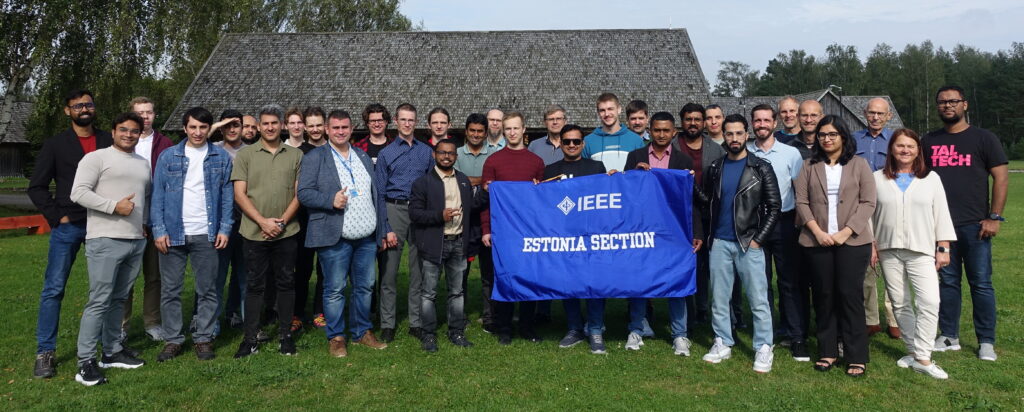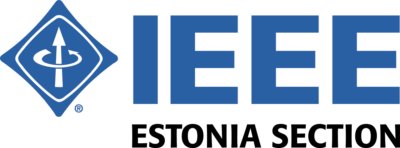Upcoming Events
News
Augustiseminar 19-20.08.2010
IEEE Eesti augustiseminar leiab aset Kullamaa Jahilossis 19-20.08.2010. See on järjekorras juba 10. sellelaadne üritus.
Oodata on mõnusat olemist ning huvitavaid ettekandeid.
Lisainfo http://isc.dcc.ttu.ee/ieee/ws/ws2010.asp
Toetajad: ELIKO ja National Semiconductor Estonia
Biorobootika keskuse diskussiooniõhtu, Tallinn, 5.05.2010
TTÜ Biorobootika Keskuses Akadeemia 15A-111 on täna 5. mail kell 16.00 kaks külalist ja toimub ettekande ja diskussiooniõhtu teemadel
– Spiking Neural Networks – Toomas Kirt ja
– Reward System and Dopamine – Andrea Soltoggio, kes räägib tema poolt juhitavast projektist Adaptive Modular Architectures for Rich Motor Skills (AMARSi)
Andrea Soltoggio tutvustuseks:
Andrea Soltoggio holds a MSc in Computer Engineering from the Norwegian University of Science and Technology (NTNU) and a MSc from
Politecnico di Milano. He obtained a PhD in Computer Science from the University of Birmingham, UK, in 2008. During his markedly
international career, he has worked in the field of control systems, volutionary computation, robotics, neural models of learning and
reward. He is now a senior researcher with the Research Institute for Cognition and Robotics (CoR-Lab) in Bielefeld, Germany, where he also
coordinates the EU Large Scale Integration Project AMARSi (Adaptive Modular Architectures for Rich Motor Skills). Further information on
his webpage http://andrea.soltoggio.net/work/
Ta juhib ühtlasi projekti Adaptive Modular Architectures for Rich Motor Skills (AMARSi)
The EU FP7 AMARSi project is a large scale integration project that aims at achieving rich motor skills in robots. Human motor primitives are studied to achieve similar dynamics in robots with compliant mechanics and morphological computation. Adaptive modules with learning principles will be combined in control architectures at
different cognitive levels. The results will be demonstrated on the uadruped Cheetah and on the humanoid iCub robot. More on http://amarsi.soltoggio.net/
Paulo J G S Ferreira, Sampling, Tallinn 3.05.2010
Paulo J G S Ferreira ettekanne
Emaspäeval , 3.mail 2010, 15:30 VI-229.
Ettekande sisu:
Topics in sampling — historical, mathematical and engineering.
Part 1. Historical: implementing sampling in the 1930s
Part 2. Mathematical: sampling, analysis and equivalence groupings
Part 3. Engineering: integrate-and-fire converters
Each “part” would take 15 minutes or so, to save some time at the end
for questions.
1) The historical part would probably be interesting to engineers or
mathematicians, even if they don’t know anything about sampling. Parts
of this will sound familiar to you — apologies for that. Maybe I can
add some new angles.
2) The second part would be more theoretical, and would explain the
connections between a number of results, some of which are central in
analysis, and the sampling theorem. The reasons for studying this
would also be explained. This is ongoing work, but mature.
3) The last part would explain the principles behind
“integrate-and-fire” converters. This is ongoing but preliminary work.
More information about the presenter can be found at http://www.ieeta.pt/~pjf
IEEE Demokeskuses 15.04.2009
15. aprillil kell 15.00 toimub IEEE Eesti külaskäik Demokeskusesse. Demokeskus on värskelt loodud “näitus”, mille eesmärgiks on koondada ühte kohta Eesti firmade loodud IT-lahendusi. Keskus demonstreerib erinevate ametite töökohti ja süsteemide koostööd.
Liikmetel palun registreeruda: http://www.doodle.com/2txwisfzg53hizfb
IEEE ja Tehnopol: IB Krates 7.04.2009
7. aprillil 2009 kell 15.00-17-00 korraldavad Tehnopol ja IEEE ühise Tehnopoli elektroonikaettevõtete klubi ürituse.
Ettekande teevad Toomas Tommingas ja Tõnu Näks IB Kratesest. Teemad:
- IBKrates – ettevõtte ja rahvusvahelise koostöökogemuse esitlus
- IB Kratese tarkvara kasutamisest süsteemide programmeerimisel
Ettekannete järel on aega ka omavahel suhtlemiseks. IEEE liikmetele on üritus tasuta. Palun liikmetel registreeruda mõlemal alltoodud lehel.
http://www.doodle.com/p326vet947e84pmb
http://www.tehnopol.ee/et/Syndmuste-kalender/Tehnopoli-yritused&nID=120

